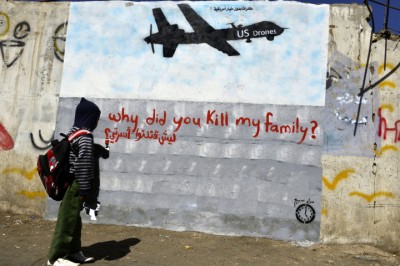Drone Vet Speaks Out: Killer Crafts More Deadly Than Government Admits
"The psychological pressure of not knowing if strikes were accurate was debilitating at times."

An insider in the U.S. military’s covert drone war has confirmed what critics of the killing program have long-warned: the program is far more “dangerous” than the government admits.
In an op-ed published in Salon on Tuesday, the unnamed former Air Force imagery analyst writes, “I was the only line of defense between keeping someone alive and providing the intelligence for a strike using technology not accurate enough to determine life and death.”
The military veteran—published under the name AFISR Predator (for Air Force Intelligence, Surveillance, and Reconnaissance)—goes on to describe how a drone pilot’s success was partly determined by the number of “enemy kills.” The analysts were encouraged to fly missions “even when there was nothing of consequence to see, no targets to strike and no American ground forces to protect,” wrote the veteran.
Despite calls for greater transparency, President Barack Obama has yet to acknowledge or provide any accounting for the number of civilians killed by the U.S. drone program. The Bureau of Investigative Journalism estimates that in Yemen roughly 135 civilians were killed by either confirmed or possible drone strikes since 2014 and in Pakistan over 950 civilians have been killed by confirmed strikes.
Countering claims made by the CIA director John Brennan that the use of drones will “dramatically reduce,” if not eliminate, the danger to U.S. personnel, AFISR Predator describes the prevalence of spousal, alcohol and drug abuse among his 100-person unit; two members had even taken their lives.
“The psychological pressure of not knowing if strikes were accurate was debilitating at times,” AFISR Predator writes.
“Our team worked between 12- and 14-hour shifts in a Sensitive Compartmented Information Facility, sometimes flying for hours seeing nothing, sometimes seeing unspeakable carnage,” AFISR Predator continues. “Then we returned home to spouses and families, where our security clearances prevented us from sharing our experiences in an effort to decompress from what we had witnessed.”
AFISR Predator concludes by saying that the military must “reconsider” their reliance on killer drones. “They are not as legal, targeted or accurate as the government makes them out to be, and they are not without consequences for our troops.”

